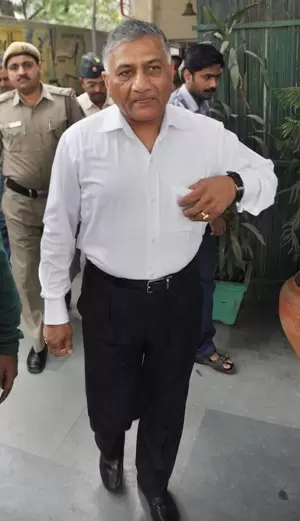V K Singh's moment of truth has a lot to educate and enlighten the common man

06-December-2013
Vol 4 | Issue 49
To be born in Tanwer (Tomar) clan of the Chandravanshi lineage meant that you either became a soldier or a farmer.
Vijay Kumar Singh, like his grandfather Daffadar Mukhram Singh, and father Jagat Singh, became a soldier and ended as India’s 26th Chief of the Army Staff, though the Air Force was his first preference.
“Courage and Conviction” is an absorbing life story of a distinguished soldier who created history by taking the government to court for tampering with his date of birth to put in place its ‘line of succession’ plan, as argued by the Attorney-General in the Supreme Court.
 |
|
Former Indian Army Chief Gen. V K Singh narrates an absorbing life story in his autobiography (Photos: Indian Photo Agency)
|
An elegantly produced book, it begins with a quotation from Robert F Kennedy’s Day of Affirmation speech which says, “Few men for the right cause brave the disapproval of their fellows, the censure of their colleagues and the wrath of their society.
“Moral courage is a rarer commodity than bravery in battle or great intelligence. Yet it is the one essential, vital quality for those who seek to change which yields most painfully to change.”
Gen VK Singh was motivated by Ecce Homo to share internal life experiences for writing his autobiography, a must read for anyone interested in knowing the strange ways of working of the Defence ministry and its babudom.
In spite of the entire establishment ganging up against him and using a considerable section of the media to besmirch his reputation, there is no rancor or bitterness in his narration of the eventful two years he was the COAS.
The first commando to become the chief of the Indian Army, he was awarded the Commando Dagger and the prestigious Sam Manekshaw Trophy at the Young Officers Course in Mhow,
Written with Kunal Verma, son of a fellow Rajput Regiment officer and author of “The Long Road to Siachen” and the “Northeast Trilogy,” the book “Courage and Conviction” brings out various facets of army life, how postings are at the mercy of uninformed bureaucracy and career prospects are subject to the whims and fancies of senior officers.
VK Singh’s career would have ended as a Brigadier as the board had passed him over for promotion to the rank of Major General. He was already one year behind his contemporaries.
Prompted by two of his GOCs to seek redress, he made a formal complaint. His case was reviewed four months later and was cleared for the rank of major general. There was no looking back.
The book gives revealing accounts of the Bangladesh war that liberated East Bengal from Pakistan; Operation Blue Star in which Gen. K Sunderji misled Indira Gandhi which eventually led to her assassination; Operation Meghdoot, code name for the 1987 operation to occupy Siachen; IPKF misadventure in Sri Lanka where the Army went to protect the Tamils and ended up fighting them; Operations Brasstacks and Trident , classic examples of how wars can be engineered by misreading intelligence reports without proper analysis and cross-checking; and Operation Parakram that brought to light how the Army is ill equipped to fight a war.
On his IPKF experience he writes: “We were supposed to protect the Tamils who were not under our control, and yet we had an agreement with the Sri Lankans. Whoever had been the diplomatic brains behind the agreement had failed to understand the situation on the ground. It was a complete failure of statecraft to say the least.”
In a prologue to his autography under the heading ‘The moment of truth,’ Gen. VK Singh narrates his meeting with then Union home minister, Palaniappan Chidambaram, a week after taking over as the COAS.
Maoists had ambushed and killed 76 CRPF jawans near Chintalnar village in Dantewada district of Chhattisgarh.
Without beating about the bush, Chidambaram asked: “You know the Naxal problem is a major national issue. Why do you oppose the deployment of the Army in Naxal areas?”
The General answered that it was a socio-economic and governance issue and not a secessionist movement. Therefore it would not be proper to use the Army “against our own people.”
His offer of all support to the home ministry by way of training and logistics did not go down well with Chidambaram. While the book is silent on the fallout of this brief encounter, VK Singh remained virtually a persona non grata with the political and bureaucratic establishment.
Although Defence minister AK Antony did nothing to remove bureaucratic roadblocks on the path of VKSingh, he has nothing but kind words for the Raksha Mantri.
“Antony is a good human being. It is difficult not to be charmed by his obvious sincerity, for as an individual, he is extremely receptive to all good ideas,” says the book.
On his date of birth controversy, VK Singh says that starting from his birth certificate to matriculation certificate, legally accepted documents, to NDA, IMA, MS Branch and 14 Rajput record of his father, his passport and entire dossier showed the correct year of birth as 1951.
In April 2006, the promotion board had cleared him for the next rank, lieutenant general. Two letters followed in quick succession. The first was from the MS Branch, signed by Lt.-Gen. Richard Khare stating that it had been decided by the COAS that his year of birth henceforth would be 1950.
The second letter directed him to proceed to Ambala to take over II Corps forthwith. Questioning the chief’s order was tantamount to insubordination which was not tolerated in the Army.
According to the Army rules, the date of birth of an officer could not be changed after two years of being commissioned. Throwing the rule books in the dustbin, VK Singh’s was changed 36 years after being commissioned, and that too by the COAS.
Doing what the chief wanted did not change when VK Singh was actually born. From the President of India, Prime Minister, Defence minister to the Supreme Court everyone failed to grasp this simple truth.
And Antony remained a silent, helpless spectator throughout this sordid drama. “In the mysterious ways of the Indian system, I have been sucker-punched,” writes the author.
Describing the functioning of the Army HQ, VK Singh says pushing files is never an exhilarating job for a soldier.
“But pushing files where it is a foregone conclusion that everything you try to do is going to be mired in red tape the moment it leaves your desk can numb the brain.”
As far as the world of the babu was concerned, each requirement of the military was a ‘file’ and it did not matter if the item needed by the Army was worth one-millionth of what an aircraft or ship would cost.
 |
|
Gen V K Singh reveals in his book what is done to ensure that the annual defence budget is not utilised
|
It would have to go through exactly the same process and would take a minimum of 36 months, if everything went well. Defence budget get a sizeable chunk of money allotted for acquisitions and other projects year after.
Not once had the Army been able to fully utilise the allotted funds and at the end of the year the unutilised money would be re-appropriated by the government. In financial year 2010-11, the full amount was utilised for the first time since independence, much to the surprise of the Finance ministry.
Emboldened by the success, VK Singh decided to leave nothing to chances in the 2011-12 budget and had fresh proposals in place well before April. The political executive, aware of the Army chief’s game plan, quietly posted out the Joint Secretary (Acquisition) and the post was kept vacant for seven months.
All proposals sat in files that were not even opened, for no one else in the ministry could initiate the process. The new incumbent took two months to go through the accumulated files and nothing moved for nine months.
Allotting funds for defence liberally and ensuring they are not utilised is “the biggest con that is played on the people of the country,” the General says.
The book abounds in interesting anecdotes, some amusing, some hilarious. VK Singh was in the habit of partridge shooting for the table. Yogja, his younger daughter, showed him a draft letter she had written to be sent to Maneka Gandhi, complaining against her father’s habit which she found objectionable.
A compromise was struck that no meat will be cooked in the Army chief’s kitchen and Yogja will not forward the letter to Maneka. At a training session, on the subject of morale, a soldier was asked to explain the difference between ‘fear’ and ‘panic.’ Saab, phear dar hota hai. Ye hamare level pe hota hain. Panik unche dar je ka dar hota hain jo officer level pe hota hai. (Fear means being afraid and it happens at our level, to soldiers. Panic is a higher level of fear which happens to officers).
VK Singh comments sadly that procurement and acquisitions had made the armed forces “the cash cow” for successive governments and it proved beyond his power to put an end to it because of the lack of support and cooperation of the PMO.
He singles out one particular senior officer in the PMO for much of the problems during his brief tenure as COAS.
VK Singh ends his autobiography with an apt quote from Winston Churchill which meant a lot to him. “The only guide to a man is his conscience; the only shield to the conscience is the rectitude and sincerity of his actions.
It is impudent to walk through life without this shield, because we are so often mocked by the failure of our hopes and upsetting of our calculations; but with this shield, however the fates may play, we march always in the ranks of honour.”
Courage and Conviction (An autobiography) By General VK Singh with Kunal Verma, Aleph Book Company, 2013 (Rs. 595)
Sam Rajappa is Consulting Editor of The Weekend Leader














